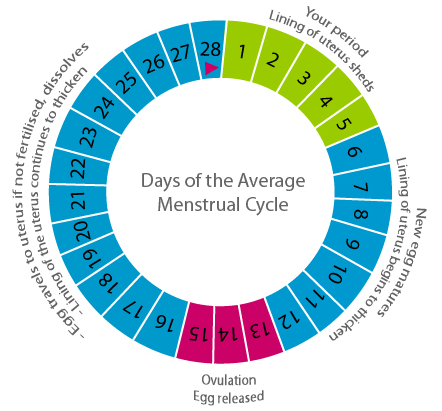There is a pattern to your menstrual cycle that can be tracked easily. This can provide you with the information you need to know whether a short cycle is irregular and a cause of concern, or to be expected given what is going on in your life at the moment.
This can provide you with important clues on fertility, hormone balance and health. If you spot irregularities, it is time to see your doctor as your reproductive health is very important to protect.
What Is the Average Length of a Menstrual Cycle?

The menstrual cycle can range from 21 to 35 days in length. It is measured from the point at which your period stops to when the next one begins. The actual period of menstruation, when the lining of the uterus is discharged, can last from 2 to 7 days.
The normal menstrual cycle is going to vary greatly from woman to woman, and by age and lifestyle. Some have short menstrual cycle, while others have longer ones.
When a Menstrual Cycle Is Considered Short?
If your cycle is occurring less than 21 days apart, then it is considered to be a short menstrual cycle. The cycle is a response to ovulation. If there is no fertilization then a hormone (the follicle stimulating hormone, FSH) is released that causes the lining in the uterus to be released from the body. When the hormone begins to be released earlier than it should, the menstrual period shortens and this can indicate a problem within the reproductive system.
A short menstrual cycle will look much different in each woman that experiences it. They can be as short as 8 days, or as long as 20 – but still be short for that individual. This is why tracking your cycle is so important, it establishes what your normal range is so you can know when something has changed.
Possible Causes of Short Menstrual Cycle
Many conditions may contribute to a short cycle; and most of the time, these are not serious. But still, it's important to track your period to better manage your condition.
- Hormonal imbalances: Menstrual cycle disturbances are always caused by hormonal imbalances; however, what may be causing those hormonal imbalances can be varied. It may be a chemical imbalance in the body caused by genetics, stress, lifestyle, diet and other things.
- Health conditions: If you always have short menstrual cycles, there's a possibility that you may be having some kind of health condition such as a thyroid gland that is either overactive or underactive.
- Environmental factors: Factors such as travel, moving to a new place, the leave of important ones in your life, a break apart, changes in job, as well as many other stressful conditions can affect your menstrual cycle and make it short.
- Medications: It's possible that some medications you are taking are affecting the hormones balance of your body, leading to a short cycle.
Should I Worry?
If you are having short menstrual cycles, there is generally nothing to worry about. Often times young ladies who first get their periods may have irregular cycles. It is also common, as you age, for the menstrual cycle to become more stable and shorter until menopause. If you are starting to experience a longer menstrual cycle, especially those more than 35 days in length, then there may be an issue.
How to Deal With It
The remedies really depend on the causes of the condition. The only way to find out why your cycle has changed is to see a doctor.
Usually short menstrual cycle caused by external factors would usually get back to normal after several months. Or you can try ways like exercising regularly, reducing your stress with relaxation techniques, maintaining a good diet to help.
For conditions related to thyroid, hormonal therapy and medication may prove helpful.
What About Prolonged Menstrual Cycle?
If your menstrual cycle is lasting longer than 35 days, then this may mean that you are not ovulating on a regular basis. There are several different reasons that this could happen. What is most common is that the progesterone is not released within the body to do a failure of maturation of the follicle that is supposed to occur during ovulation. If your body is not releasing FSH then the follicles that are responsible for the development of progesterone are not maturing. This means that estrogen levels are unchecked and the lining of the uterus continues to thicken. Once the uterus can no longer support the lining, it will begin to break apart and come out. This then starts menstruation and it will continue until the lining is completely discharged, often with heavy bleeding and clotting.
How Can I Prevent Irregularities from Happening?
Menstrual irregularities are not something that should be ignored or taken lightly. While there are many old wives tales about how to treat them, and even some supplements sold online to prevent irregularities but neither of these work – and they could be dangerous. The best way to prevent irregularities is to track your period so you are aware of them as soon as they start and to have regular exams.
Some of the common warning signs of irregularities include:
- A short menstrual cycle
- A prolonged menstrual cycle
- Spotting between periods
- Heavy bleeding
- Unusual pain
- Pain and fever associated with using tampons
There are many potential causes for these issues, but you need to see your doctor to make sure that nothing serious is the cause. Having a regular pelvic exam, plus keeping track of your menstrual cycle, can provide you with what you need to spot irregularities when they first begin and are easier to treat. The health of your reproductive system is about more than just whether or not you can have a child – it can affect your whole life.
